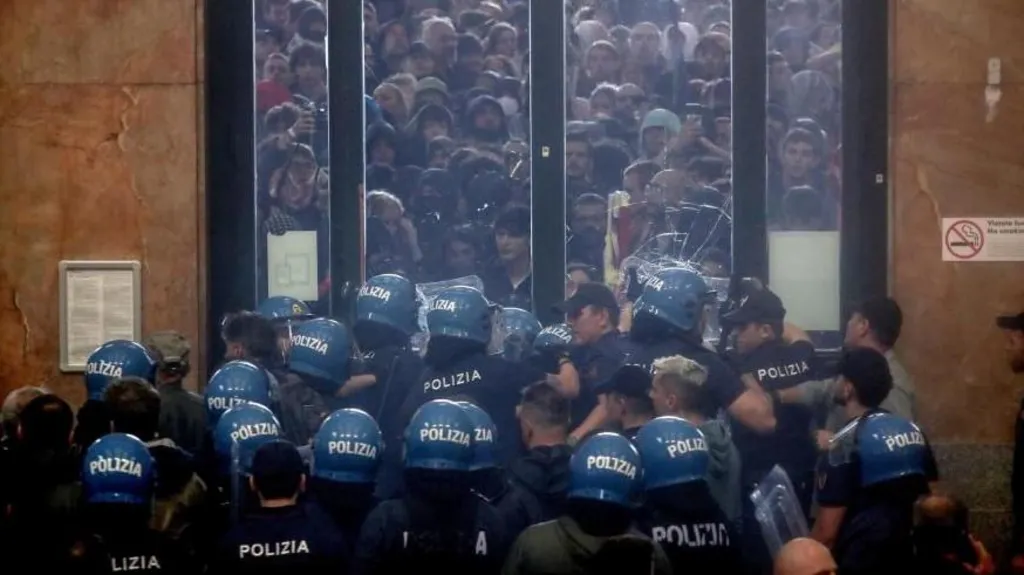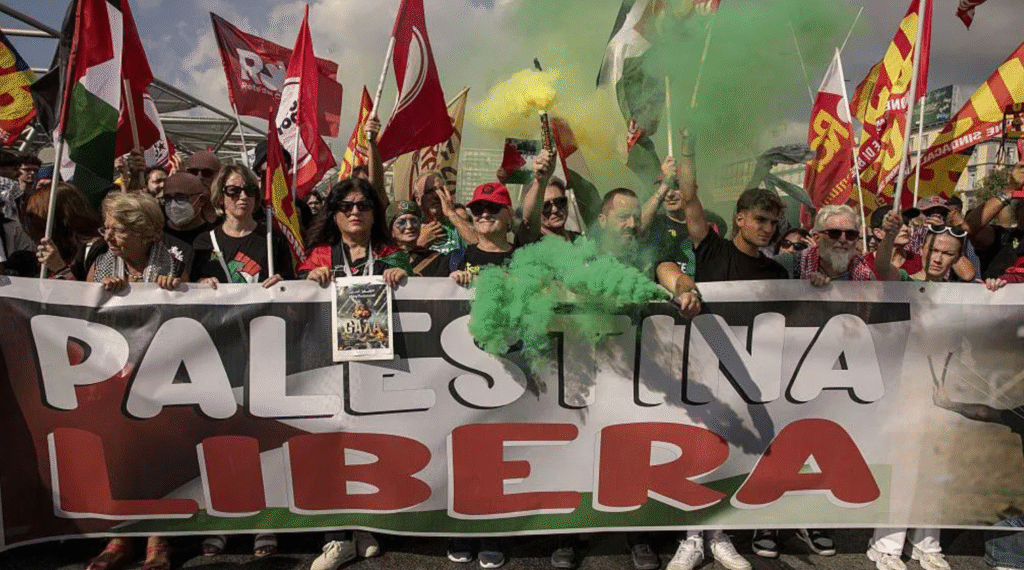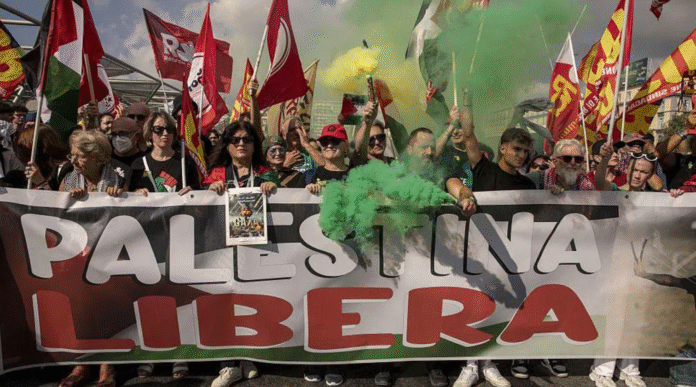Italian Gaza Protest Clashes: Thousands Strike Across Italy
The Italian Gaza protest clashes have erupted into one of the most significant political flashpoints in Europe this year. On Monday, thousands of Italians took to the streets in more than 80 towns and cities, staging strikes and demonstrations in solidarity with Palestinians. The day of action, coordinated by grassroots unions, quickly turned tense, particularly in Milan and Rome, where confrontations with police left dozens injured.
According to reports, nearly 60 officers were hurt in Milan after violence broke out near the city’s central station. Protesters carried banners demanding a ceasefire in Gaza, chanting slogans like “Free Palestine” and “Let’s block everything.” What began as a nationwide strike soon escalated into dramatic street battles, marking a pivotal moment in Italy’s political debate over Gaza.

Political Fallout Over Italian Gaza Protest Clashes
Italian Prime Minister Giorgia Meloni condemned the scenes in Milan as “shameful” and accused fringe groups of hijacking peaceful demonstrations. Her comments came after a wave of criticism from political opponents, who accuse her government of lacking clarity and leadership on the Gaza conflict.
Although Meloni has grown more critical of Israel’s ongoing offensive, she has refused to follow France in formally recognizing a Palestinian state. Critics on the left argue that her hesitation weakens Italy’s credibility in Europe, while her supporters claim premature recognition would be “counterproductive.”
France’s Recognition of Palestine Adds Pressure
The Italian Gaza protest clashes took place on the same day that French President Emmanuel Macron announced his country’s decision to officially recognize a Palestinian state. Macron described the move as both a “necessity” and a “great diplomatic victory” for France.
France joined a growing list of nations, including the UK, Canada, and Australia, that are backing Palestinian statehood. Paris insists the recognition is part of a broader “peace and security plan for everybody,” with support from countries like Belgium, Malta, and Luxembourg.
Israel, however, denounced Macron’s decision. Prime Minister Benjamin Netanyahu vowed that there would be no Palestinian state west of the Jordan River, while President Isaac Herzog warned recognition would “embolden the forces of darkness.”
Demonstrations Spread Across Italy
The Italian Gaza protest clashes were not limited to Milan. Major cities including Rome, Bologna, Turin, Florence, Bari, and Palermo saw disruptions as teachers, dockworkers, and students joined the strike.
-
In Rome, more than 20,000 people gathered at Termini station, one of the busiest rail hubs in Europe.
-
In Bologna, protesters blocked the city’s main ring road, prompting police to deploy water cannons and tear gas.
-
In Turin and Bologna, university students barricaded lecture halls, declaring solidarity with Gaza.
-
At Italy’s major ports in Livorno and Genoa, dockworkers halted activity, causing significant economic disruption.
Protesters waved Palestinian flags, burned a U.S. flag in Milan, and shouted for an immediate ceasefire. The diversity of participants, from workers to students, underlined the nationwide frustration.
Violence Overshadows Peaceful Voices
While most demonstrators remained peaceful, fringe groups in Milan turned violent, clashing with riot police outside the central station. Reports confirmed that stones, smoke bombs, and even metal girders were thrown at officers.
Milan’s Mayor Giuseppe Sala condemned the vandalism, calling it “unjustifiable and harmful to Gaza’s cause.” Senior ministers echoed his sentiment, warning that violence only alienates the Italian public from genuine solidarity movements.
Prime Minister Meloni added that such destruction “will not change a single thing in the lives of people in Gaza but will have very real consequences for Italian citizens.”
Divisions in Italian Politics
The Italian Gaza protest clashes also deepened political rifts inside Italy. Opposition leader Elly Schlein of the Democratic Party criticized Meloni for failing to address Gaza in parliament. Instead, Schlein accused the prime minister of “downplaying international crises” during a lighthearted television appearance.
Left-wing politicians argue that Italy’s refusal to recognize Palestinian statehood weakens its voice in Europe, while Meloni’s supporters emphasize caution, claiming premature recognition risks destabilizing international diplomacy.

Europe’s Shifting Stance on Israel
The protests in Italy mirror a broader European trend of growing criticism toward Israel’s military operations in Gaza. The European Commission recently condemned the “horrific events taking place on a daily basis,” while leaders such as Germany’s Chancellor Friedrich Merz have also voiced stronger objections to Israel’s actions.
However, Germany insists recognition of a Palestinian state is “not currently on the table,” framing it instead as a step for the end of a political process rather than the beginning.
This divide within Europe highlights why Italy’s position, and the Italian Gaza protest clashes, carry so much symbolic weight.
Symbolism in Paris: Eiffel Tower Lit Up
Adding to the drama, the Eiffel Tower in Paris was lit with both Palestinian and Israeli flags alongside a dove carrying an olive branch, just hours before Macron’s announcement. The symbolic gesture aimed to present France as a mediator between two peoples, though critics argued it sent mixed signals.
Town halls across France also displayed Palestinian flags, defying government orders to maintain neutrality. Macron’s decision was hailed by some as a diplomatic breakthrough, while others called it a reckless reward for Hamas.
Conclusion: What the Italian Gaza Protest Clashes Mean for Europe
The Italian Gaza protest clashes were not just about strikes or student protests, they revealed a deeper divide in Italian and European politics over Gaza. For many, the protests symbolized solidarity with Palestinians. For others, they represented chaos and disorder, overshadowing legitimate grievances.
Italy now finds itself under pressure both from its own citizens and from European allies. With France moving forward on recognition of Palestine and other nations following suit, the question remains: how long can Giorgia Meloni’s government avoid taking a clear stance?
What is certain is that the Italian Gaza protest clashes have placed Italy at the center of Europe’s debate on Gaza, peace, and political responsibility.

